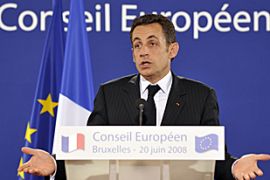EU to push for reform treaty
Leaders resolve to continue ratifying Lisbon treaty despite Irish “no” vote.

Diplomats attending the summit said the rising fuel prices and threats of new sanctions against Zimbabwe, are also being discussed.
Irish dissent
Before the meeting, Javier Solana, the EU foreign policy chief, said: “We have to agree to respect the result of the Irish referendum but… see how we can continue the proper ratification.”
The EU is pressing the remaining seven countries that have not yet approved the text, which replaces a failed EU constitution, to do so, trying to confine the dissent to Ireland.
But the document faced uncertainty in the Czech Republic, where it was sent to the constitutional court to examine whether it is in line with the country’s constitution.
EU leaders were seeking assurances from the Czechs on Friday that ratification would continue there but Prague acknowledged the text faces strong opposition in the upper chamber of the parliament within the largest ruling party.
The Lisbon treaty outlines how the 27-country bloc, which is set to take in more countries from the Balkans and possibly Turkey in the coming decades, will operate.
It provides for streamlined decision-making, and drops vetoes in such policy areas like policing and immigration.
Fuel protests
Leaders will also continue to discuss skyrocketing food and fuel prices.
EU nations are facing problems as consumers complain of more costly food and fuel while truck drivers and fishermen say high oil prices are ruining their livelihoods.
Inflation in euro currency nations is running at a 16-year high, cutting into Europeans’ spending power and the region’s economic growth.
The European commission has said government can give temporary subsidies to people hurt by the current price squeeze.
In a statement to be adopted at the end of the summit, the EU is expected to say that in order to avoid distorting prices and competition, such measures should be “short-term and targeted”, adding that EU leaders call on the executive commission to examine the feasibility of tax breaks to smooth the impact of sudden oil price increases by October.
Biofuel plans
Europe’s leaders were also expected to agree on long-term initiatives to reduce energy consumption and increase farm output.
They also will try to ease global pressure on food supplies by re-examining how plans to push for more biofuel crops might affect farming and the environment.
On the international front, diplomats said EU leaders will discuss issues concerning Sudan, cyclone stricken Myanmar and Macedonia’s election violence.
The diplomats spoke on condition of anonymity because they are not authorised to speak to the media.